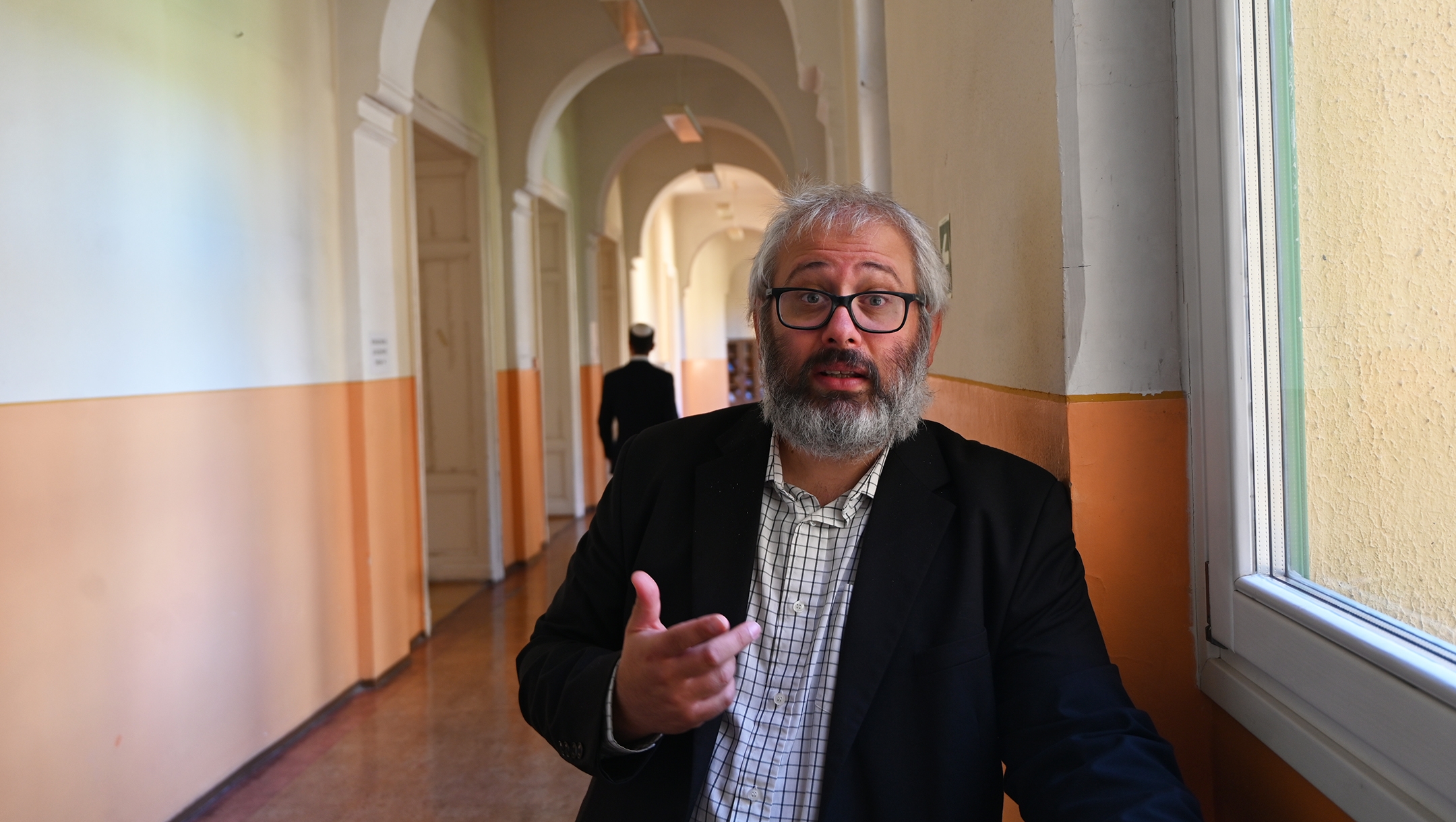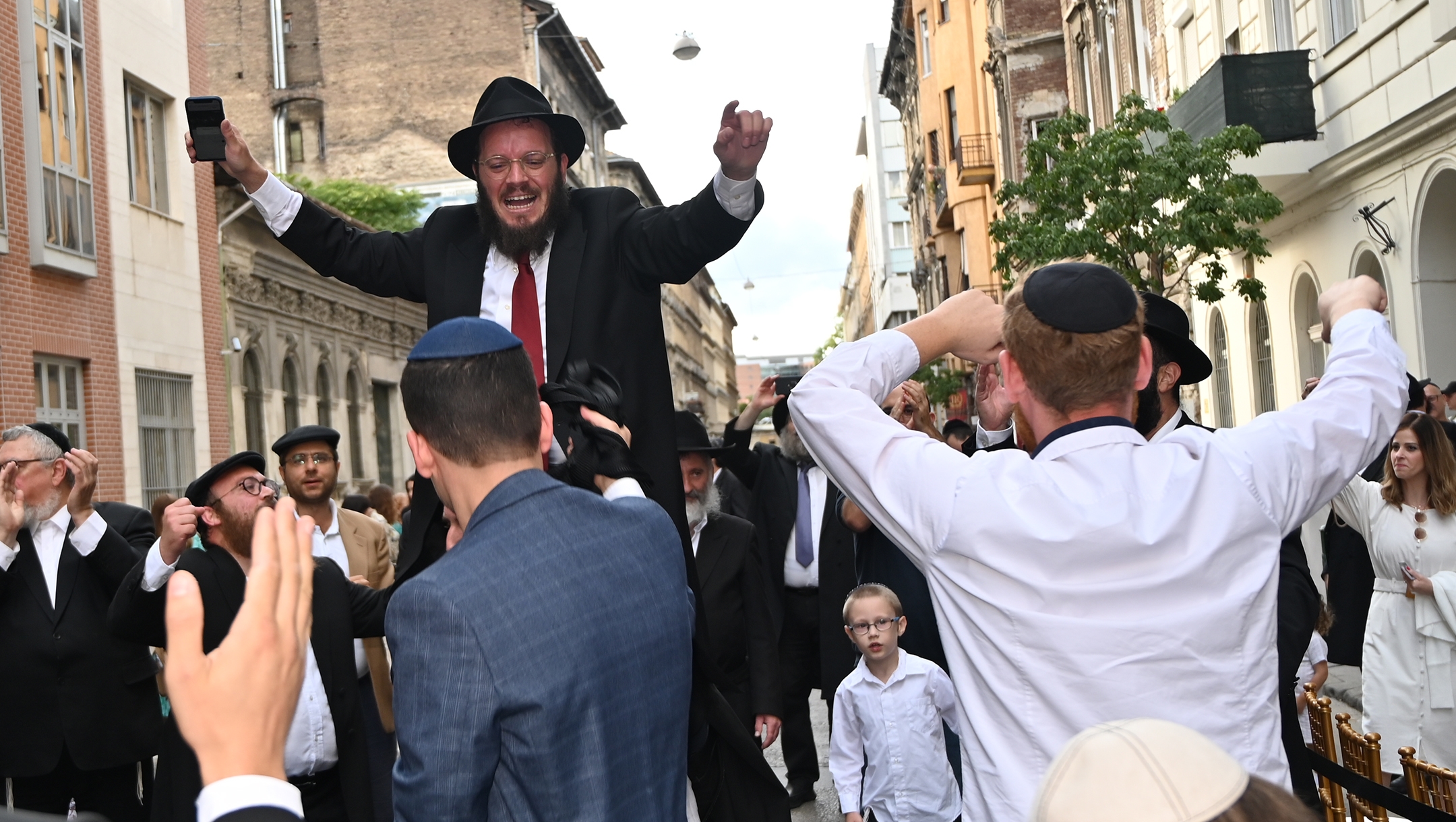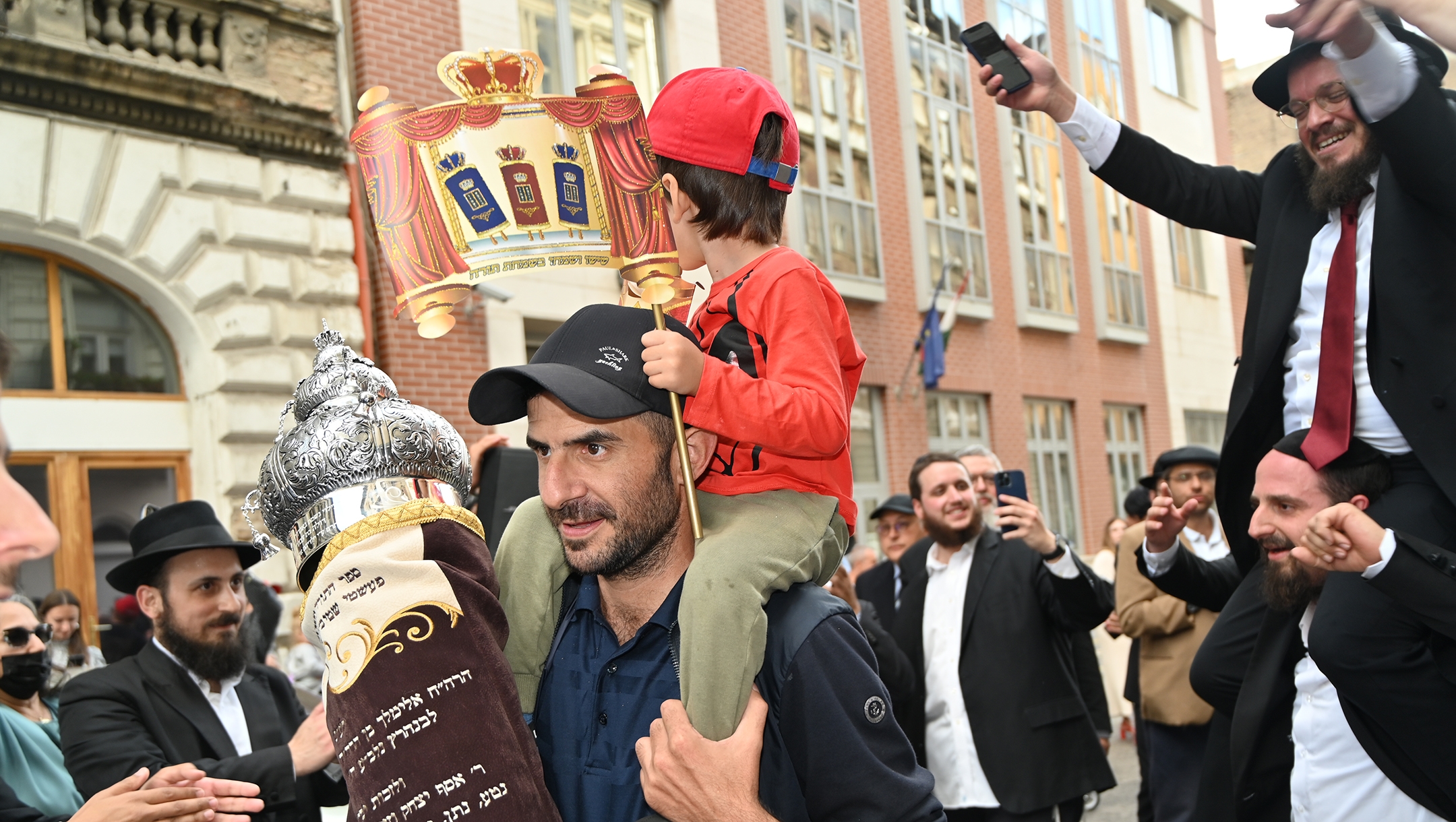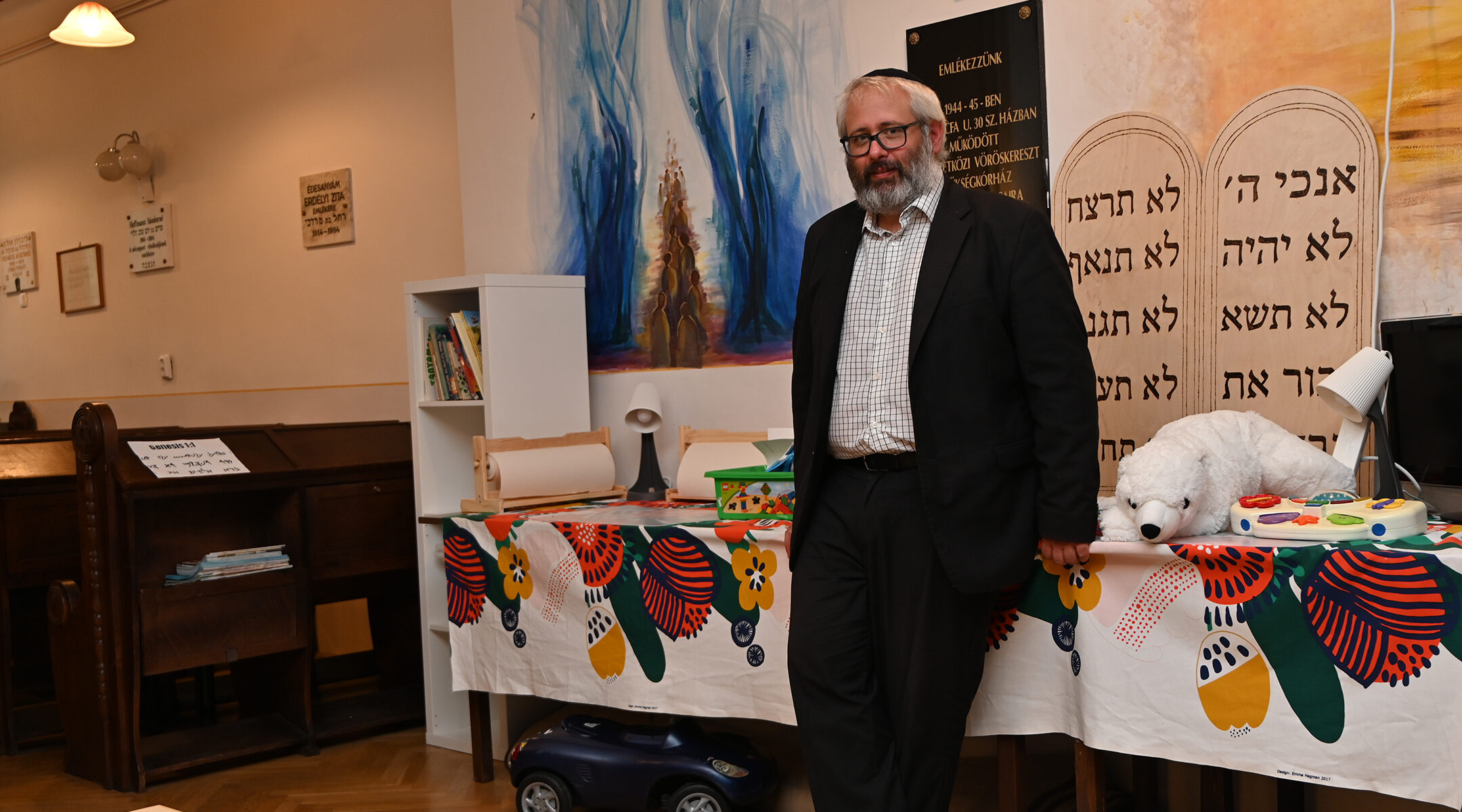BUDAPEST (JTA) — In the summer of 2020, Gabor Finali was enjoying some hard-earned career achievements.
A likeable and thought-provoking rabbi and cantor, Finali, 44, was seeing attendance grow at the Ohel Avraham synagogue, the graying congregation he inherited in 2017. Young families were showing up at the apartment-sized congregation in Budapest’s busting center, whose main hall is strung with neon lights. Some 200 people, many casually dressed, now gather to sing and pray on Shabbat as their children scamper around a play corner laden with toys.
But in July, 2020, Finali suffered a demoralizing setback when Mazsihisz, the Jewish umbrella group that pays his salary, publicly accused him of blasphemy and kicked him off its rabbinical council, the first time the group had taken such a step against one of its members.
Mazsihisz was upset over several of Finali’s provocative Facebook posts. One of them accused Israel of “slowly brewing” another Holocaust, charging that the Jewish state has caused “chaos” since its founding in 1948 and is “the reason for most, if not all, attacks on Jews in the Diaspora.”
In another post, he appeared to draw parallels between a Chabad leader and a villain from “Star Wars.” And in another, Finali described the Hasidic group in disparaging terms.

Rabbi Gabor Finali speaks to a journalist at the The Budapest University of Jewish Studies, Aug. 29, 2021. (Cnaan Liphshiz)
“Russian background, American PR, Eastern fanaticism and superstition,” Finali wrote in Hungarian. “It’s a successful recipe, they would tell you. And all of this in the role of a fig leaf waiting to be used, Rebbe Menachem Machiavelli himself would envy them. If, one day trouble comes, which may even have something to do with them, how many of them will go back to where they came from?”
Rabbi Menachem Mendel Schneerson is Chabad’s late leader and a revered figure in the movement.
Following an uproar, Finali wrote a general apology about his statements that “cause offense” and deleted some of the posts. But the walkback wasn’t enough to diffuse the scandal, which was the talk of Jewish Budapest for weeks.
“I mind being silenced and I mind being called an enemy of Israel, a place to which I am very connected,” Finali told the Jewish Telegraphic Agency last month. “I was hurt by this. But ultimately I am not here to fight over politics, I’m here to lead a community. And even though they tried to humiliate me, I am able to continue to lead my community.”
It was a traumatic moment for Finali, who has a silver beard and a pleasant tenor voice, which he uses to speak about Jewish history with infectious enthusiasm and humor. He punctuates his arguments with jokes, cultural references — he actually is an avid Star Wars fan — and Talmudic anecdotes.
He is also an up-and-coming leader of Neolog Judaism, a progressive movement similar to American Conservative Judaism that has increasingly found itself at odds with a growing and more assertive Chabad movement. A native Hungarian Jewish movement, Neolog is the largest Jewish denomination in the country and an affiliate of the Mazsihisz federation.
Over the last decade, the number of Chabad emissaries in Hungary has doubled to about 30 and 10 new Chabad synagogues have opened, along with three new schools, three community centers and a kosher slaughterhouse. Half of Budapest’s 20-odd active synagogues are now affiliated with Chabad, up from only two a decade ago.

Rabbi Shmulik Oirechman dancing on the shoulders of other Jews at the opening of the Vorosmarty Street Synagogue in Budapest, Aug. 27, 2021. (Cnaan Liphshiz)
“Chabad is not outside the establishment anymore,” said Rabbi Slomo Koves, the director of EMIH, an association of Hungarian communities affiliated with Chabad. “It has become a main component of the establishment. So many people participate in both Mazsihisz and Chabad activities that you can’t speak about Chabad like that.”
The Hungary expansion is part of a broader push by Chabad in Europe where, to the displeasure of the Jewish establishment in a number of countries, the movement is increasingly eclipsing longstanding Jewish institutions. In Russia, Ukraine, and Belarus, Chabad has prevailed as the dominant Jewish organization. In the Netherlands, a Chabad envoy, Binyomin Jacobs, is a chief rabbi. And in France, Chabad to a large extent dominates the Orthodox Jewish education scene.
In Hungary, the tug of war has been complicated by the rise of the right-wing government of Viktor Orban, a populist whom critics accuse of eroding democracy and encouraging antisemitism. Defenders say he is merely promoting European values and Hungarian heritage.
In 2016, Mazsihisz’s relationship with Orban deteriorated and the group briefly suspended contact with the government over a state-sponsored statue that Mazsihsz says “whitewashed Hungarian complicity in the Holocaust.” EMIH defended the government. Three years later, the government upgraded EMIH’s status, putting it on equal footing with the older and larger Mazsihisz, and provided funding for its expansion.
“Neolog Jewry is a progressive enterprise at its root,” Finali said. “Chabad is far more ideologically compatible with conservatives like Orban, which is why it’s becoming the government’s go-to group.”
Koves denied that the group is prepared to turn a blind eye to the government’s rewriting of history, citing multiple cases in which the group criticized allies of Orban for antisemitism. “We will not compromise on historical accuracy,” said Koves, who in 2018 was tapped by the government to lead a controversial Holocaust museum that Mazsihisz had boycotted.
Mazsihisz has long been Hungary’s dominant Jewish institution. It is the local affiliate of the World Jewish Congress and had long been the Jewish community’s principal representative body, supporting a range of social, religious and educational activities and spearheading relations with public authorities.
Its rivalry with Chabad has at times grown bitter, though the groups did come together during Hanukkah in a bid for communal unity. Affiliates of both groups have provided journalists with materials deemed damaging to the rival outfit. And other rabbis employed by Mazsihisz have lashed out at EMIH before, with one calling them “sellouts to Orban.”
But by attacking Chabad in harsh terms, Finali “opened Mazsihisz for attack,” said Tibor Steiner, a 48-year-old lawyer and father of two who attends Finali’s synagogue.
“Mazsihisz needed to look like they’re punishing him,” Steiner said. “They symbolically denounced him but kept him in place as a rabbi. A political arrangement.”
Rabbi Jonatan Megyeri, a follower of Chabad and editor-in-chief of the conservative news site Neokohn, which he says is the community’s largest-circulation publication with over 20,000 page views daily, had urged Mazsihisz to clarify its position on Finali’s statements.
“I didn’t want Finali fired or shamed. I actually like him on a personal level and appreciate his intellect,” Megyeri told the Jewish Telegraphic Agency. “But he’s a rabbi at Mazsihisz, which claims to represent Hungarian Jewry, and I wanted clarity on whether he speaks for them with his very distasteful and radical statements.”
Hungarian Jewry, Megyeri added, is not large or robust enough to be “the kind of broad tent that we see in the United States or the United Kingdom. It has two consensus: Israel’s right to exist and the need to commemorate the Holocaust. When you have authority figures questioning any of the two, you cause incredible offense.”

A father carries a Torah scroll into the Vorosmarty Street Synagogue in Budapest, Aug. 27, 2021. (Cnaan Liphshiz)
László Bernát Veszprémy, a Holocaust historian and journalist, said that Finali’s reservations about Israel date back to Neolog’s founding in Hungary in the 19th century as a movement of largely assimilated and middle class Jews, many of whom were anti-Zionist.
“They thought that the idea that Jews are a distinct nation with a ‘real’ homeland somewhere else played into the hands of antisemites,” Veszprémy said.
But Zionism’s popularity soared after the Holocaust, prompting a shift in the movement toward a more pro-Israel stance.
Finali “rediscovered something that was very much within the Neolog tradition, but has been buried for a long time,” Veszprémy said. “He is authentic, even if he is wrong — and I definitely believe that he is wrong. In this sense, Fináli is a Neolog fundamentalist, and it is always difficult to deal with someone’s own fundamentalists.”
Finali’s salary is still paid by Mazsihisz as compensation for his work as the rabbi of a Neolog congregation, but he has been expelled from the organization’s rabbinical council, and therefore cannot vote on policy and administrative issues.
Yet it’s precisely Finali’s candor and passion that have fueled his popularity. Steiner, Finali’s congregant, said the rabbis is unusual among his counterparts, many of whom prevaricate to avoid getting into trouble.
“He taught me Hebrew and he got me to connect with Judaism for the first time in my life after growing up in a totally secular family,” Steiner said of Finali. “I don’t agree with his views on Israel and Chabad, for whom I have a lot of respect. But Gabor is genuine. He’s real. He speaks what’s on his mind and that’s why you want to be in shul with him.”
JTA has documented Jewish history in real-time for over a century. Keep our journalism strong by joining us in supporting independent, award-winning reporting.






